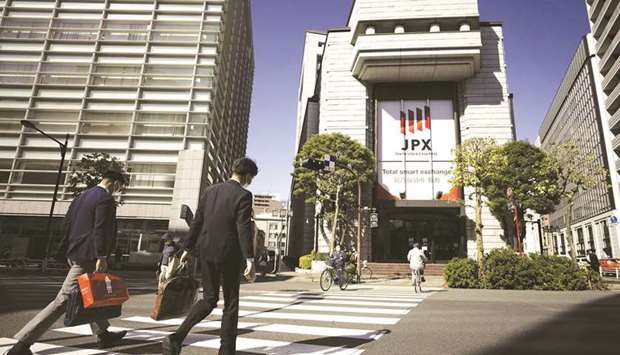Tokyo’s Nikkei led a rally in holiday-thinned trade in Asia yesterday following a record-breaking day on Wall Street with investors buoyed by Joe Biden’s huge new infrastructure spending plan and growing optimism over the economic recovery.
With most equity and commodity markets in the region closed for Easter, business was light but the mood remained decidedly upbeat ahead of the release of key US jobs data that is expected to confirm that the world’s top economy is getting back on its feet.
Confidence that global growth will soar as vaccines allow economies to open has for now overtaken worries that the rebound will fan inflation and force central banks to wind back their market-boosting monetary policies. “Before you worry about inflation, there’s reflation and I think that’s the main theme in the market,” Ed Campbell, at QMA, said.
Biden’s $2.25tn rebuilding package – coming soon after the passage of his $1.9tn stimulus – has reinforced the view among investors that the US economy will run hot, with analysts saying its corporate tax implications were also being put aside for now. With this in mind, and after a strong read on US March manufacturing, the S&P 500 broke the 4,000-point barrier for the first time, while the Nasdaq and Dow also enjoyed healthy gains.
And the few markets in Asia that were open followed suit, with Tokyo up 1.6%, Seoul almost 1% higher and Shanghai also in positive territory along with Bangkok.
“The US equity market opened in the second quarter with a sonic boom ushering in a great Good Friday,” said Axi strategist Stephen Innes.
He added that equities likely had further to run higher as vaccines are administered around the world, and despite a pick-up in infections in parts of the world including France, which is facing another lockdown. “Vaccine rollouts remain the game’s name and drive the narrative, even with the EU lagging, as investors view this delay in the context that the catch-up is but a function of time,” he said.
Eyes are now on the release later Friday of US non-farm payrolls figures, which will give the latest view on the state of the huge economy, with some observers suggesting the reading could come in above one million. In Tokyo, the Nikkei 225 closed up 1.6% to 29,854.00 points and Shanghai – Composite ended up 0.5% to 3,484.39 points. Hong Kong was closed for a holiday.
Meanwhile the Shanghai Stock Exchange (SSE) said yesterday it is tightening scrutiny over corporate bond issuance, and has punished a brokerage for lax due-diligence in bond underwriting. The move comes after Chinese exchanges strengthened inspections on initial public offerings (IPOs), as regulators seek to limit financial risks while promoting growth of China’s capital markets.
China has about $4.5tn of outstanding corporate bonds, traded on the country’s exchanges and the interbank market.
SSE, China’s main exchange for corporate bond trading, said it has launched onsite inspections on select bond issuance applicants with a focus on robustness of due diligence by underwriters.
The bourse said in a statement it publicly censured metal products maker Ningxia Yuangao Industrial Group Co for “fake” and inadequate disclosure ahead of its default, and sent warning letters to its underwriter Huaxi Securities Co and its law firm. Ningxia Yuangao could not be reached immediately for comment. Huaxi Securities said it had nothing to add to what the SSE said. China is stepping up reforms of its capital markets. It has adopted a US-style registration system for securities issuance on SSE’s Nasdaq-style STAR Market, as well as SSE’s corporate bond market.
But signs of lax due-diligence by underwriters led to regulators tightening screws on IPOs late last year.
Over 100 companies have suspended their IPO process since December, many withdrawing applications voluntarily.
China’s top securities regulator Yi Huiman said last month that the registration-based IPO system doesn’t mean lower bars for listing, vowing to punish underwriters who try to bring “sick” companies to the IPO market.

Pedestrians cross a road in front of the Tokyo Stock Exchange. The Nikkei 225 closed up 1.6% to 29,854.00 points yesterday.
